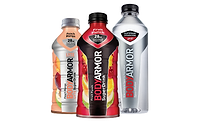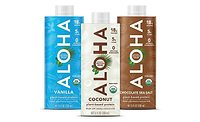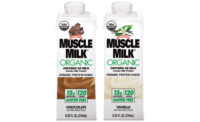The continued trend of non-athletes increasing their protein intake and wellness macro trends has broadened the appeal of sports and protein drinks, leading to “skyrocketing performance” for protein drinks, noted Scott Dicker, brand and retail client insights lead at Chicago-based SPINS, in the May issue of Beverage Industry.
Although there is blurring between the two categories, many new functional beverages are marketing the hydration and health benefits of those ingredients in a sports setting, Dicker added.
“Many, though, are less likely to call themselves sports drinks; therefore, capturing the functional beverage consumer as well as the traditional sports drink consumer,” Dicker explained in Beverage Industry’s May issue. “There also is a large increase in sports supplement drinks. Traditionally powdered performance supplements are evolving toward ready-to-drink (RTD) convenience options as well, such as pre-workout and amino acid drinks.”
“Protein is being added to all sorts of drinks — to meal replacements for satiety, traditional muscle growth and recovery drinks, functional beverages as a better-for-you boost, [and] plant-based beverages, in particular, tout their protein content to compete with dairy counterparts,” he said.
The trend for professional athletes, weekend warriors and everyday consumers to be well-hydrated with more low-sugar, organic and natural options is contributing to stable growth in both the sports and protein drinks market, according to market analysts.
Liquid and powdered protein and meal replacement products generated sales of $2.6 billion and more than $882 million, respectively, in multi-outlets for the 52 weeks ending Feb. 25, according to data from SPINSscan.
Both Purchase, N.Y.-based PepsiCo Inc.’s Gatorade and Atlanta-based The Coca-Cola Co.’s Powerade brands were ranked as top-performing non-aseptic sports drinks for the 52 weeks ending Feb. 25 in U.S. multi-outlets, according to data from Chicago-based Information Resources Inc. (IRI). Gatorade Perform topped the chart with $2.8 billion in sales, followed by Gatorade Frost at nearly $787 million, IRI data states.
(Individual brands)
| Dollar Sales | % CHANGE VS. PRIOR YEAR | MARKET SHARE | % CHANGE VS. PRIOR YEAR | |
| Gatorade Perform | $2,596,214,839 | 0.0 | 41.2 | -8.1 |
| Gatorade Frost | $813,193,038 | 8.0 | 12.9 | 1.2 |
| Powerade Ion4 | $754,260,601 | -4.1 | 12.0 | -0.3 |
| Gatorade | $563,798,782 | 72.9 | 8.9 | 3.9 |
| Gatorade G2 Perform | $266,105,148 | -9.3 | 4.2 | -0.3 |
| Gatorade Fierce | $250,773,160 | -16.2 | 4.0 | -0.7 |
| Powerade Zero | $227,322,868 | 5.2 | 3.6 | 0.2 |
| Powerade | $173,700,781 | -19.8 | 2.8 | -0.6 |
| Gatorade Flow | $169,222,502 | 330.6 | 2.7 | 2.1 |
| BodyArmor | $120,919,670 | 9.8 | 1.9 | 0.2 |
| Category total* | $6,302,237,052 | 0.0 | 100.0 | — |
Source: Information Resources Inc. (IRI), Chicago. Total U.S. supermarkets, drug stores, mass merchandisers, gas and convenience stores, military commissaries, and select club and dollar retail chains for the 52 weeks ending May 20.
Although it sits at No. 9 for the 52 weeks ending May 20, Gatorade Flow experienced a triple-digit, year-over-year percentage increase of 330 percent and sales of $169 million, based on IRI data. The overall non-aseptic sports drink category notched stable sales of $6.3 billion for the same time frame.
“Gatorade and Powerade still make up 90 percent of the sports drink market,” Kantar Worldpanels’ Weissheier said in Beverage Industry’s May issue. “To protect their share, they have rolled out options ranging from new flavors to organic to low sugar. As for new players trying to cut into their share, the one seeing the most success is BodyArmor. This brand, which boasts sponsorships with athletes Anthony Rizzo and Kobe Bryant, drives the idea of clean hydration. They have a lower sugar content, added coconut water and no artificial coloring. They have had success so far due, in part, to distribution from the large [Dr Pepper Snapple Group] (DPSG) network.”
(Individual brands)
| Dollar Sales | % CHANGE VS. PRIOR YEAR | MARKET SHARE | % CHANGE VS. PRIOR YEAR | |
| Gatorade Perform | $49,301,614 | -12.1 | 60.4 | -3.4 |
| Propel | $23,579,030 | 26.4 | 28.9 | 7.7 |
| Private label | $4,264,140 | -6.8 | 5.2 | 0.0 |
| Mio | $1,599,031 | 612.1 | 2.0 | 1.7 |
| Nunn | $1,253,446 | -5.8 | 1.5 | 0.0 |
| Category total* | $81,559,031 | -0.1 | 100.0 | — |
Source: Information Resources Inc. (IRI), Chicago. Total U.S. supermarkets, drug stores, mass merchandisers, gas and convenience stores, military commissaries, and select club and dollar retail chains for the 52 weeks ending May 20.
The Netherlands-based Innova Market Insights notes that the United States has the most developed sports nutrition market in the world, accounting for more than 30 percent of global launches in the 12 months ending October 2017. The sports powders subcategory accounted for nearly 70 percent of the total, it adds.
Sports and protein drinks, particularly for non-athletes, will continue to drive the market, but beverage-makers should be aware of consumers’ wellness goals, including the need for organic products and high transparency, SPINS’ Dicker said.
“[H]ighly caloric drinks with lots of sugar don’t match the consumers’ wellness goals, so lower-sugar options are definitely a key factor in sports drinks’ future, as well as other functional ingredients such as amino acids or herbal ingredients for those other health purposes consumers pursue when they choose a sports drink for general wellness,” Dicker said. “… All beverage categories are jumping on the protein trend. Coffee Iconic & Super Coffee, even alcohol muscle vodka. There isn’t a segment of beverages that isn’t emerging with high-protein varieties.” BI




